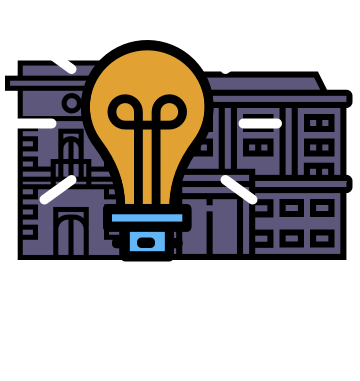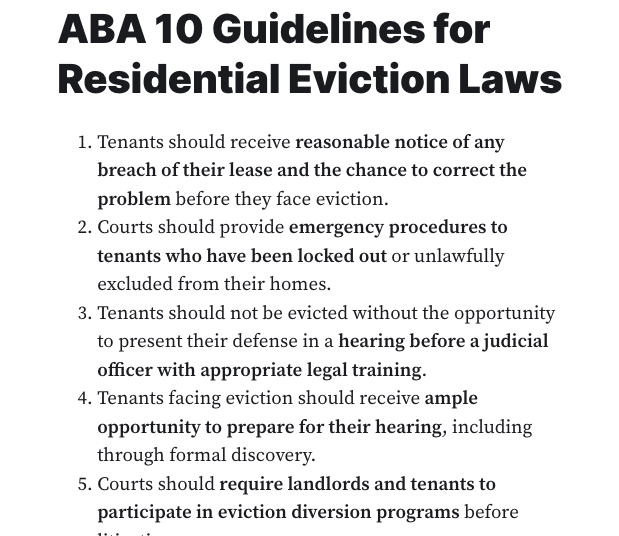Basic Information
Program Name
Right to Counsel policy, also known as “Free Lawyers for Tenants” or “Universal Access to Legal Services”
Short Description
Tenants living in certain zip codes in New York City, who are below a certain income level, can qualify for a free lawyer if they face an eviction lawsuit.
This free lawyer will give them full representation in their case (rather than brief advice or limited assistance).
The program is funded by the city government, with the NYC Office of Civil Justice partnering with the courts, legal aid providers, and a coalition of community groups to establish and expand the program.
Location
Certain zip codes in New York City, including in the Bronx, Brooklyn, Manhattan, Queens, and Staten Island. Each year, the list of eligible zip codes expand until by 2022 all zip codes should be covered.
Duration
Ongoing, beginning with a 2017 enactment of the legislation for Universal Access to Counsel program, and with a 2022 deadline to have all zip codes in the city covered by the program
Funding
New York City government
Size (number of beneficiaries)
Tens of thousands of NYC households have received full legal representation and/or brief advice through the program since it began in 2017
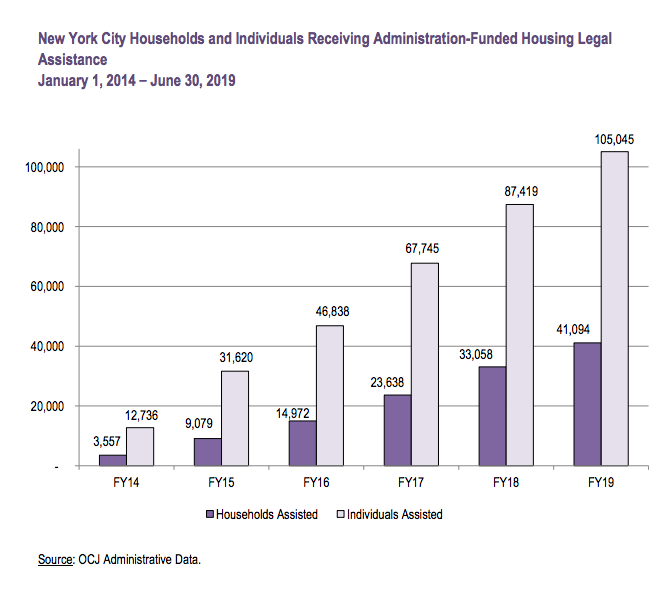
Stakeholders
Who designed and set up the program?
In the 2010s, a coalition of actors came together to make proposals for right to counsel (including the Community Action for Safe Apartments in the Bronx, the Community Development Project at the Urban Justice Center, and the eventual Right to Counsel NYC Coalition).
Then in 2017 the NYC City Council approved a law that would require the NYC Office of Civil Justice (OCJ) to provide lower-income tenants with free access to legal services within five years (by 2022). Mayor Bill de Blasio signed the law in August 2017, and provided funding to cover the costs of legal representation.
The Housing Court’s supervising judge, the Office of Court Administration, the legal aid groups, the Right to Counsel Coalition, and others worked together to make sure that the courts were ready for the program. Eviction cases in the specified zip codes were assigned to specific judges, in special rooms that facilitated the free lawyers to do interviews, eligibility screening, referrals, and consultations. The housing court staff were also trained to spot eligible tenants, refer them to lawyers, and help them apply for rental assistance or social services.
Read more on the updates on Right to Counsel law and implementation at the Civil Right to Counsel page on NYC.
Who runs and manages the program?
City administrators, legal services, court judges and staff
Who funds the program?
New York City government
Intended Beneficiaries: Who does the program target?
Low-income tenants facing eviction court cases in NYC
Program Details
How does the program work? What are the typical paths of action that the beneficiary + the service-provider take?
Tenants have the right to an attorney if their income is at or below 200% of the poverty line.
They may access this free lawyer by calling 311, connecting on the webpage Evictionfreenyc.org, or being screened at their first hearing at court.
Court dates are scheduled on special Right to Counsel court days.
During these days, attorneys are present to review whether the tenant would like an attorney. Attorneys and court staff help screen tenant-defendants for possible eligibility for a free lawyer, and then connect them with the service.
The attorney and tenant will go over the case and household income.
If the tenant wants to be represented by the attorney, then an official notice will be filed with the court and a future date will be scheduled with the tenant to go over the case.
What assets can be shared for others to use?
The NYC Right to Counsel legislation is available here, with its legislative history and full text.
The Right to Counsel NYC Coalition has a large set of resources available for community organizing, outreach fliers, and explanations of Right to Counsel in a number of different languages.
They also have a Campaign Toolkit with step-by-step phased guides for getting to right to counsel in a city.
The NYC Open Data portal has regularly-updated datasets of eviction-related information.
The NYC Housing Courts have court statistics reports with court caseload activity reports, and summaries of evictions conducted.
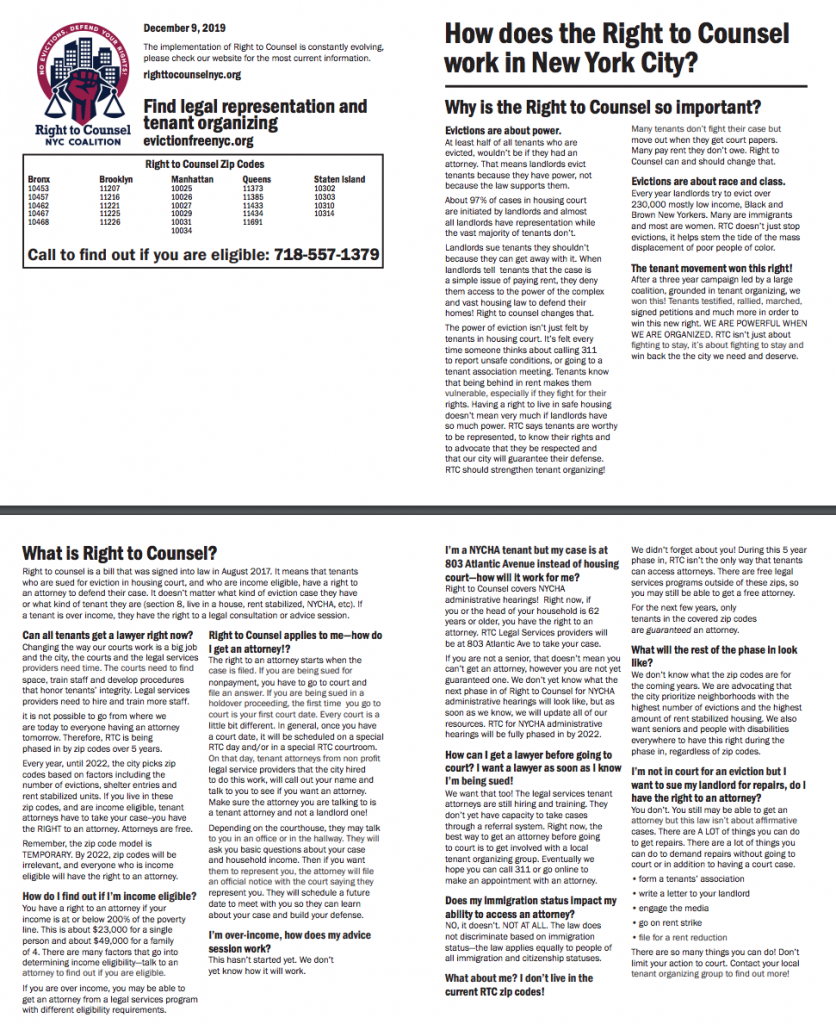
Evidence Base
What are the plans for monitoring and evaluation?
Some of the metrics for evaluation include the number of people represented by RTC-funded attorneys; the number of tenants able to remain in their homes (and avoid displacement) , and the reduction in eviction filings.
The NYC Office of Civil Justice is tracking the number of eviction filings, comparing the numbers in right to counsel zip codes to those in comparable non-right-to-counsel zip codes.
Have any evaluations been conducted so far?
The NYC Office of Civil Justice issued a Year Two report on how right to counsel has been implemented. This tracks numbers of filings, warrants of eviction issued by courts, proportion of tenant-defendants who have legal representation, the demographics of tenants assisted, and other data points. (There is also a year 1 report from 2018 from the OCJ available here.)
Groups like the Community Service Society has evaluated intermediate outcomes in terms of number of filings, which seem to have dropped in 2018-2019 in those areas served by Right to Counsel. Here is their 2019 report on the effects of the program on displacement and filings.
The Furman Center at New York University issued a report that evaluated the policy implementation of the law, in its first year, to draw lessons for other jurisdictions.
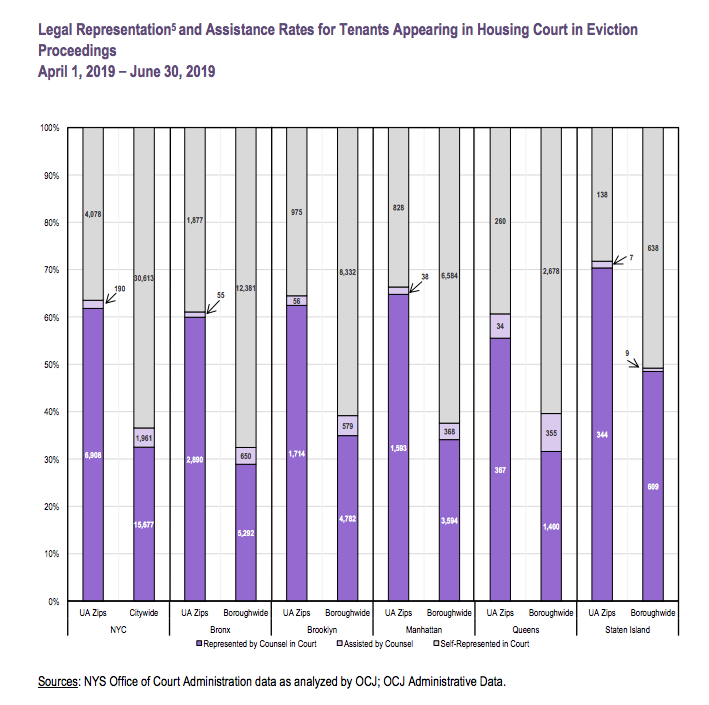
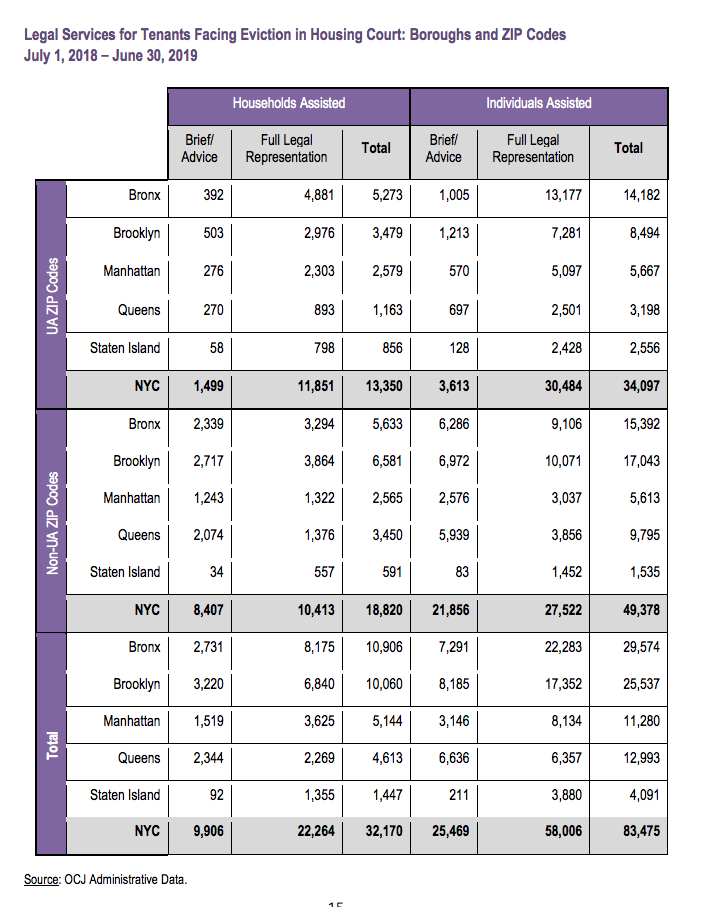
Contact and Follow-Up Info
Program Website
See the Right to Counsel coalition website here: https://www.righttocounselnyc.org/
See the NYC Housing court site on Universal Access here: https://www.nycourts.gov/COURTS/nyc/housing/aboutUniversalAccess.shtml
See the NYC government’s Office of Civil Justice here: https://www1.nyc.gov/site/hra/help/legal-assistance.page
Documentation + Links
See the NYU Furman Center Dec. 2018 report here, which goes into much more detail on the program’s roll-out and programmatic design: https://furmancenter.org/files/UAC_Policy_Brief_12_11-18.pdf
See the Right to Counsel NYC Coalition toolkit here, with full details on campaigning and community organizing to establish right to counsel: https://www.rtctoolkit.org/
Point of Contact for more information
The NYC government’s Office of Civil Justice group working on right to counsel is available at : civiljustice@hra.nyc.gov
Sateesh Nori, attorney-in-charge of the Queens neighborhood office of the Legal Aid Society in New York City, at snori [@] legal-aid.org
